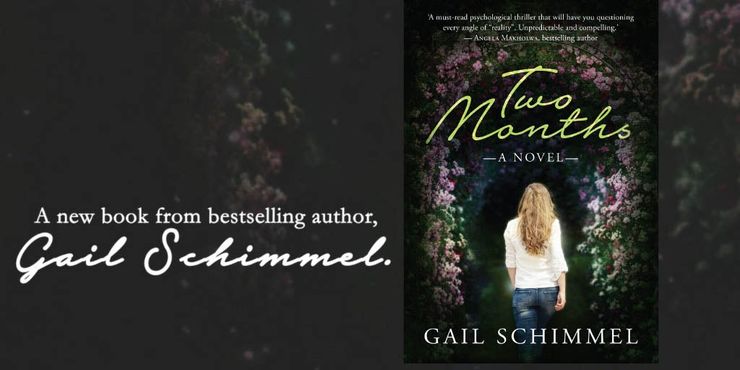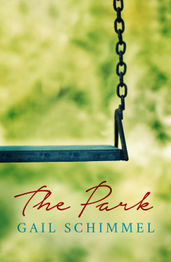Gail Schimmel on her new domestic thriller, Two Months
"A must-read psychological thriller that will have you questioning every angle of 'reality'. Unpredictable and compelling" – Angela Makholwa, bestselling author

We recently celebrated the launch of Two Months, Gail Schimmel’s new domestic thriller that will keep you turning the pages until the very end. Due to the impact of COVID-19 and in line with the lockdown restrictions, we launched the book virtually. If you missed the virtual launch, you can watch it HERE. Over a hundred people from different parts of the world tuned in for the launch, which was facilitated by author, screenwriter and script editor, Pamela Power.
We’ve put together an author Q&A with Gail, featuring questions that came from individuals who participated in the virtual launch.
Did the idea for Two Months come to you as you wrote The Accident?
It did, and I think the two things are definitely linked. For The Accident, I obviously had to research comas to some degree and in that remembered a lot of what I had learnt in my Psychology degrees about fugues and amnesia. I think it’s something that fascinates us all – this complexity of our brains that can disconnect us from ourselves.
How did you find the plotting and writing process for a thriller (that's different to your previous novels)?
It was much more complex. I don’t know if this is a thriller thin gor because this was a complex story. I had diagrams and arrows and plots and comments.
How do you come up with the storyline - where does the inspiration come from?
All my ideas come from the “what if” in life. “What if” this ordinary situation got complicated by x, y and z. There is traditional writing advice that says, think of a plot and then complicate it. I think that’s something I do instinctively when I write.
How much time do you spend planning before you start writing - what is your process?
Depends on the book, but I always know how the book will end, and more or less where I should be in the middle. I take quite a lot of time getting to the next book in my head, playing with ideas, letting the concept drift around – and then suddenly something happens and I almost get a feeling in the palms of my hands, and I know that this is IT. Then I make some broad notes and start. It’s a fun time – that excited start!
You move from past to present very skilfully – how difficult is it to maintain that when writing?
It was a mess!! I kept getting confused and writing the wrong details in the wrong timeline and then having to go back and unravel it and make more notes. Added to that was my decision to write the past in third person, so I would routinely slip into first person in the past and third person in the present and then have to rewrite.
How long did it take you to write the book?
This one took about a year, if we ignore the rewrites that I had to do because my laptop was stolen.
What is your writing genre? Is it social commentary, if that falls within any of the genres?
I think all fiction is social commentary on some level really. I find genre defining quite hard and often counterproductive, because it puts readers off things that they shouldn’t be put off – think of labels like “chick lit” and “women’s fiction”. But if pushed, I am somewhere on “Book Club reads”, “Domestic Noire” and for this one, “Thriller”.
Which part of the book do you love most?
Oh that’s really hard. I think, I probably liked the flashbacks to the distant past best as a writer, because that was the least confusing!!
If you didn't have a full time 'day' job, would you write even more?
That’s the million dollar question, isn’t it? I suspect a bit more, but I also am a big believer that busy people get more done than people who aren’t busy – so I sometimes think my day job forces me to not be precious about my writing.
Do you ever struggle with a lack of confidence about what you are writing - what do you do to get over yourself?
Maybe this is where the day job answer comes in – I just don’t have the time or energy for self-doubt! I also think that I am very realistic about what sort of writer I am - which frees me. I am a storyteller, not a great literary crafter of beautiful sentences. (As that sentence itself illustrates!!) So I get my story told, without angsting about whether I used the best word or the most touching alliteration, or whatever it is the more literary writers do that is so clever...
When writing, do you yourself get involved in the characters or plot. Movie actors sometimes get too involved but what about fiction writers?
A little bit – I have things going on in my head, and sometimes I bring the emotions out of the writing session with me. But fundamentally – maybe again because I have so much on my plate, I don’t really have the luxury of disappearing into another world.
The Accident
by Gail Schimmel
Twenty-six years is a long time not to be alive.
Since The Accident that ruined her life, Catherine has lived on autopilot, going through the motions of work and motherhood without being fully present. Trying to fill the gap, her adult daughter, Julia, is looking for love in all the wrong places, and wreaking havoc on the lives that she touches along the way.
Just what will it take to shock Catherine back into life?
The Park
by Gail Schimmel
Rebecca doesn’t expect to make new friends at this stage of her life. But when she becomes mother to little Amy, she finds herself spending her afternoons in the park. There she meets other mothers: first flamboyant, fun Rose, and then single-mom Lilith, whose inner strength is tangible, and whose eyes never leave her toddler.
Very soon the women have formed a trio – the type of friends who feel at home in each other’s kitchens – and their daughters begin to behave like sisters. But Rebecca is about to learn that friendship is not always what it seems, and that sometimes you trust the wrong people. At exactly the moment when she needs to lean on them, one of her new friends harbours a shocking secret, and the other will turn on her in a way she could never have anticipated.
Her two park friends will change Rebecca’s life – and her family – forever.

